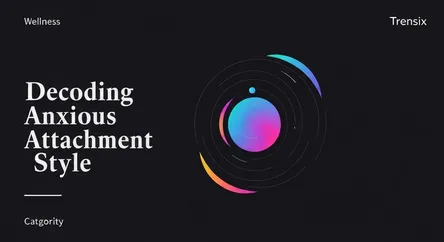Wellness
Decoding Anxious Attachment Style

Discover the anxious attachment style, a common pattern of relationship insecurity. Learn what causes it and how it can impact your connections.
What is it?
Anxious attachment is one of the four main attachment styles identified by psychologists. It is a type of insecure attachment rooted in a fear of abandonment and a strong desire for closeness. Individuals with this style often feel anxious about their relationships, craving intimacy but constantly worrying about their partner's love and commitment. This pattern typically develops in early childhood due to inconsistent parenting, where a caregiver was sometimes nurturing and available, and at other times, distant or unresponsive. As a result, the child learns that they must cling to their caregiver to get their needs met, a behavior that persists into adult relationships.
Why is it trending?
The term is gaining significant traction online, especially on social media platforms like TikTok and Instagram. A broader cultural shift towards mental health awareness and self-discovery has prompted many to explore psychological concepts to better understand themselves and their relationship patterns. Therapists and wellness influencers are making complex topics like attachment theory more accessible and relatable to a mainstream audience. This increased visibility helps people identify these patterns in their own lives, encouraging them to seek healthier ways of connecting with others and themselves.
How does it affect people?
Anxious attachment profoundly affects a person's romantic life, often leading to emotional turmoil. It can manifest as neediness, jealousy, and a constant requirement for validation. A person with an anxious attachment style might overanalyze their partner's actions, perceive neutral events as signs of rejection, and have difficulty trusting their partner's feelings. This can create a self-fulfilling prophecy, where the intense behaviors designed to secure the relationship inadvertently push partners away. This often results in a cycle of short-lived, intense, and emotionally draining relationships, impacting overall self-esteem and well-being.